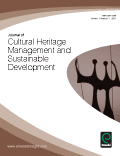
Journal of Cultural Heritage Management and Sustainable Development
Scope & Guideline
Innovating solutions for heritage and sustainability.
Introduction
Aims and Scopes
- Cultural Heritage Preservation:
The journal emphasizes the significance of preserving tangible and intangible cultural heritage, exploring various methodologies and frameworks for conservation that respect historical integrity while adapting to contemporary needs. - Sustainable Development Practices:
It examines the role of cultural heritage in achieving sustainable development goals (SDGs), promoting practices that integrate cultural, environmental, and economic dimensions. - Community Engagement and Participation:
The journal highlights the importance of involving local communities in heritage management, focusing on participatory approaches that recognize the value of local knowledge and practices. - Interdisciplinary Approaches:
Research published in the journal often employs interdisciplinary methodologies, integrating perspectives from fields such as sociology, anthropology, environmental science, and urban planning to address complex heritage management challenges. - Digital Technologies in Heritage Management:
The journal showcases innovative uses of digital technologies for documentation, preservation, and education in cultural heritage, reflecting the growing importance of digital tools in contemporary management practices.
Trending and Emerging
- Climate Change and Heritage Resilience:
Recent publications increasingly address the impact of climate change on cultural heritage, exploring strategies for enhancing resilience and integrating climate adaptation into heritage management practices. - Intangible Cultural Heritage:
There is a growing emphasis on intangible cultural heritage, reflecting an acknowledgment of its vital role in community identity and sustainability, as well as its potential for tourism and economic development. - Digital Heritage and Technology Integration:
The use of digital tools and technologies for heritage documentation, management, and public engagement is on the rise, showcasing innovative approaches to preserving cultural assets in the digital age. - Cultural Heritage as a Driver for Sustainable Tourism:
Research increasingly focuses on the role of cultural heritage in promoting sustainable tourism, examining how heritage sites can enhance visitor experiences while supporting local economies and communities. - Community-Led Heritage Initiatives:
There is a trend towards highlighting community-led initiatives in heritage management, emphasizing the importance of local involvement and ownership in conservation efforts.
Declining or Waning
- Traditional Architectural Styles:
There has been a noticeable decrease in publications focused solely on traditional architectural styles, as the journal shifts towards more integrative approaches that consider sustainability and adaptive reuse. - Historical Analysis without Contemporary Relevance:
Papers that solely explore historical contexts without linking them to contemporary issues or sustainable practices are becoming less frequent, indicating a move towards research that connects past and present. - Narrowly Defined Cultural Heritage:
Research that confines itself to specific cultural heritage topics without considering broader implications for sustainability and community engagement has seen a decline, as the journal promotes a more holistic view. - Local Case Studies with Limited Generalizability:
There is a reduction in case studies that do not offer insights or lessons applicable to wider contexts, as the journal encourages research that contributes to global discussions on cultural heritage management. - Purely Theoretical Frameworks:
Papers focused exclusively on theoretical frameworks without practical applications or case studies are less prevalent, reflecting a growing emphasis on actionable research.
Similar Journals

Documenti Geografici
Bridging Disciplines, Shaping PerspectivesDocumenti Geografici is a prestigious academic journal published by UNIV STUDI ROMA TOR VERGATA, FAC LETTERE & FILOSOFIA, specializing in interdisciplinary research bridging Economics, Geography, and History. Founded in 2019, this journal serves as a vital platform for scholars, researchers, and policymakers by disseminating innovative research findings and methodologies in the diverse fields encompassed within its scope. Currently categorized in the Q4 quartile for Economics, Econometrics and Finance (miscellaneous) and Geography, Planning and Development, and ranked in the Q3 quartile for History, Documenti Geografici offers insights that are valuable for advancing academic discourse. With its unique perspective and commitment to open dialogue, this journal is dedicated to fostering a deeper understanding of socioeconomic trends and spatial dynamics, making it an essential resource for those engaged in the humanities and social sciences. Manuscripts submitted to the journal benefit from a diligent peer-review process, ensuring high quality and relevance of published articles, thus contributing appreciably to the broader academic community.

International Journal of Conservation Science
Pioneering Research for a Sustainable TomorrowThe International Journal of Conservation Science, published by the Romanian Inventors Forum, is a premier, Open Access journal dedicated to advancing the field of conservation science since its foundation in 2010. With a strong emphasis on interdisciplinary research, the journal welcomes contributions that explore innovative methodologies and sustainable practices in conservation. Based in Romania, the journal boasts an impact factor that positions it as a leading voice in its field, reflected by its Q1 ranking in Conservation and notable placements within its categories in Scopus. With coverage spanning diverse areas from natural resource management to environmental education, the journal serves as a crucial platform for researchers, policymakers, and practitioners aiming to drive impactful conservation strategies globally. The International Journal of Conservation Science not only enhances the visibility of significant research but also promotes open dialogue and collaboration among professionals committed to preserving our natural heritage.
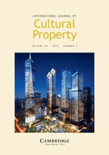
International Journal of Cultural Property
Fostering Interdisciplinary Dialogue on Cultural Assets.The International Journal of Cultural Property, published by Cambridge University Press, is a leading interdisciplinary journal focusing on the preservation, management, and legal aspects of cultural heritage. With an ISSN of 0940-7391 and an E-ISSN of 1465-7317, this esteemed publication has established itself as an essential resource for researchers and practitioners in the fields of Anthropology, Conservation, Cultural Studies, History, and Museology, ranking impressively in Q1 and Q2 quartiles across various categories as of 2023. Spanning decades since its inception in 1992, the journal covers a rich array of topics and issues pertinent to cultural property, providing a platform for innovative discourse and scholarly articles. Although it is not an open-access journal, its commitment to high-quality research is evident through its rigorous peer-review process and impactful contributions to the field. As it continues to address the complexities and challenges surrounding cultural heritage management, the International Journal of Cultural Property remains pivotal in advancing knowledge and enhancing academic dialogue within its multidisciplinary audience.

VOLKSKUNDE
Diving into the Heart of Cultural PracticesVOLKSKUNDE is a distinguished academic journal dedicated to the study of folklore and cultural traditions, published by CENTRUM STUDIE DOCUMENTATIE based in Belgium. With an ISSN of 0042-8523, this journal serves as an essential platform for researchers, scholars, and students interested in the rich tapestry of cultural heritage and ethnographic research. Although currently not available as an open-access publication, VOLKSKUNDE is committed to disseminating high-quality scholarly articles that provide critical insights into the complexities of cultural practices across diverse societies. The journal’s objective is to foster academic discourse and stimulate inquiry into folklore studies, promoting a deeper understanding of cultural dynamics. By engaging with a broad range of topics within its scope, VOLKSKUNDE is an invaluable resource for anyone looking to deepen their knowledge in the field of folkloristics.

Conservation Science in Cultural Heritage
Empowering Voices in Cultural Heritage ConservationConservation Science in Cultural Heritage is a leading academic journal dedicated to advancing the field of conservation science and museology, proudly published by MIMESIS EDIZIONI since 2001. Operating as an Open Access journal, it facilitates unrestricted dissemination of research to scholars, professionals, and students worldwide, promoting the exchange of innovative ideas essential for preserving our cultural heritage. With ISSN 1974-4951 and E-ISSN 1973-9494, the journal has earned recognition for its rigorous scholarly contributions, achieving a Q3 ranking in both conservation and museology categories as of 2023. It ranks at the 57th percentile in Museology and the 44th percentile in Conservation according to Scopus metrics, reflecting its growing impact in the academic community. The journal publishes a diverse range of articles, covering interdisciplinary aspects of conservation practices, research methodologies, and case studies, offering critically important insights for furthering understanding and promoting best practices in the safeguarding of cultural artifacts. Through this international platform, Conservation Science in Cultural Heritage aims to inspire collaborative efforts and elevate the standards of research in the vital area of cultural preservation.
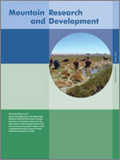
MOUNTAIN RESEARCH AND DEVELOPMENT
Unlocking the potential of mountain environments through research.MOUNTAIN RESEARCH AND DEVELOPMENT is a premier open-access journal dedicated to advancing the understanding of mountain environments and communities through rigorous research and interdisciplinary collaboration. Published by the International Mountain Society since 1981, this journal serves as a vital resource for researchers, professionals, and students in the fields of development, environmental science, and environmental chemistry. With a commendable impact factor reflected in its Q2 and Q3 quartile rankings in 2023 across various categories, it offers a platform for innovative studies that address the unique challenges facing mountainous regions globally. As a vital conduit for knowledge exchange, MOUNTAIN RESEARCH AND DEVELOPMENT fosters the dissemination of research findings, insights, and practical applications aimed at enhancing the sustainability and resilience of mountain ecosystems. Its open-access model, implemented since 2009, ensures that research is accessible to a broad audience, contributing to the ongoing dialogue in mountain studies and related fields. For detailed inquiries, the journal is hosted at the University of Bern, Switzerland.
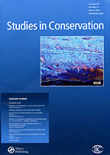
STUDIES IN CONSERVATION
Fostering Interdisciplinary Insights in ConservationSTUDIES IN CONSERVATION, published by Routledge Journals, Taylor & Francis Ltd, stands as a premier peer-reviewed journal in the field of conservation, holding a distinguished Q1 ranking in the Conservation category for 2023. With its origins dating back to 1952 and poised to continue through 2024, this respected journal provides a vital platform for disseminating high-quality research and innovative practices aimed at the preservation of cultural heritage and natural environments. The journal boasts an impressive Scopus rank of #15 out of 103 within its category, reflecting its influential role in shaping the dialogue among researchers, professionals, and students dedicated to conservation efforts. While Open Access options are not currently available, the journal remains accessible to a broad readership eager to engage with its in-depth analyses and critical studies that address urgent conservation challenges. The editorial team seeks to promote diverse perspectives and foster interdisciplinary collaboration, making STUDIES IN CONSERVATION an essential resource for anyone committed to advancing the field of conservation.
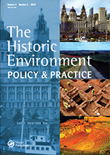
Historic Environment-Policy & Practice
Exploring Interdisciplinary Approaches to Cultural Heritage.Historic Environment-Policy & Practice is an esteemed journal that serves as a vital platform for interdisciplinary discourse within the fields of archaeology, conservation, and history. Published by Routledge Journals, Taylor & Francis Ltd, this journal enjoys notable recognition, characterized by its Q1 rankings in 2023 across all relevant categories. This esteemed status positions it among the top tier of publications, with Scopus rankings reflecting its impact, such as a remarkable 98th percentile in Arts and Humanities - History. Aimed at researchers, professionals, and students, the journal publishes insightful articles that connect policy with practical applications in the historic environment. With its dedicated focus on promoting the understanding and sustainability of cultural heritage, Historic Environment-Policy & Practice is a crucial resource for anyone involved in the preservation and study of our collective past. No open access is available, but the journal ensures high-quality peer-reviewed content showcasing the latest research and practices in the field.

International Journal of Intangible Heritage
Unveiling the Stories Behind Cultural Practices.The International Journal of Intangible Heritage, published by the NATL FOLK MUSEUM KOREA-NFMK, stands as a premier platform dedicated to the exploration and preservation of intangible cultural heritage. With an ISSN of 1975-3586 and an E-ISSN of 1975-4019, this journal has successfully carved a niche in the fields of Conservation, Cultural Studies, and Museology, achieving Q1 categorization across these disciplines in 2023. It ranks impressively in Scopus, being #17/83 in Museology and #33/103 in Conservation, highlighting its significant contribution to the academic discourse in these fields. Published in South Korea, this journal not only serves as a vital resource for researchers and professionals but also engages students aspiring to enhance their understanding of intangible heritage. Accessible without an open access model, it features a blend of scholarly articles, reviews, and case studies from 2011 through 2024, making it a robust repository for current and emerging practices in the safeguarding of cultural expressions. By fostering innovative dialogue among scholars and practitioners globally, the International Journal of Intangible Heritage plays a crucial role in the ongoing dialogue surrounding the value and significance of intangible cultural assets.

Archeologia e Calcolatori
Inspiring Dialogues in Archaeology and Computational ResearchArcheologia e Calcolatori is a distinguished open-access journal published by EDIZIONI ALL INSEGNA GIGLIO SAS in collaboration with the Italian National Research Council, dedicated to advancing knowledge in the fields of archaeology and its intersections with computational methodologies. Since its inception in 1998, the journal has become a pivotal resource for researchers and practitioners, offering a platform for innovative studies and critical discussions at the forefront of archaeological science. With its current impact reflected in Scopus rankings, Archeologia e Calcolatori is placed in Q2 for both Archaeology and Archaeology (Arts and Humanities), and its commitment to quality scholarship is evident. The journal benefits from open access, ensuring that scholarly findings are readily available to a global audience. By prioritizing the dissemination of interdisciplinary research methods and explorative analyses, it aims to foster collaboration and inspire new directions in archaeological and computational research.